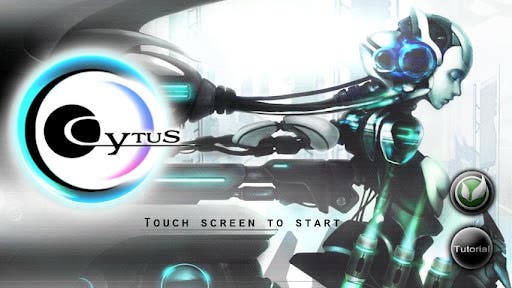App of the Day: Cytus
Bemani for nothing.
In the late 1990s, Konami's Bemani division was synonymous with music games, dominating the Japanese arcade scene to the point where its name became a catch-all term for the entire genre. Rhythm games of a form, in truth they were really more like Simon Says elevated to the level of performance art.
Whether it was kids strutting their stuff to Dance Dance Revolution at the Trocadero or a salaryman cathartically taking out the frustrations of a long workday by slapping the primary-coloured buttons of a Pop 'N' Music cabinet, seeing someone play these games well was a genuine thrill. Those dancing hands or dancing feet were evidence that here was someone who had dedicated hour upon hour overcoming the monolithic challenge of truly mastering these games.

Bemani suffered a rapid decline, partly through oversaturation, but also as music games moved from the arcade to the home console, but it's enjoyed a bit of a revival on smartphones lately. Multi-touch screens might lack the satisfying click of those lovely big arcade buttons, but are otherwise the perfect interface for the genre, and so it's hardly surprising we've seen portable versions of Jubeat and DDR.
Cytus might sound a bit like a tropical disease, but it's a fine example of Bemani, requiring a similar level of dedication to its peers to best the highest difficulty, and giving your fingers one hell of a workout in the process.
Its interface is a little different from the norm, but smartly designed. A scan line scrolls up and down the screen to match the tempo of the music, passing through grey circular touch points which gradually expand, flushing with colour as they become active. You need to tap as the line passes through the middle of a circle, or hold your finger down for longer notes. Occasionally you'll be asked to follow a diagonal line of circles, dragging your digit through them as the line rises or falls.
Anyone who played Ouendan will have a fair idea of what to expect, and while working out when a circle is set to become active takes a little time, the input timing is fairly forgiving (a feature which might upset hardcore Bemani players). Indeed, it does better than most in catering to beginners: there's a relatively accessible easy difficulty to help you find your feet, and the song continues even if you're doing badly.

You'll only find out you've failed at the end, which takes some of the pressure off: again, this is a double-edged sword at higher levels, but it allows you to get better quicker. It's respectful of your time, in other words, and it's a concession that makes sense given the portable format.
The soundtrack is classic Bemani fare: high-tempo, excitable J-pop/rock which makes up in exuberance what it lacks in sophistication. You get three songs for free on Android, with £1.99/$1.99 getting you the full selection of 18 tunes. The touch points are thoughtfully positioned to the point where it becomes easier to spot rhythm patterns and after a while you'll almost be sight-reading songs on your first attempt.
Its crisp, clean, slightly sterile presentation won't be to all tastes, but in eschewing visual distractions it allows you to you focus on the performance alone. Sure, you're unlikely to draw an audience like those hot-stepping kids and the salaryman with the whirling arms, but when you're locked into the rhythm and your fingers are moving as if independent from your body, it's every bit as hypnotically compelling to play.
App of the Day highlights interesting games we're playing on the Android, iPad, iPhone and Windows Phone 7 mobile platforms, including post-release updates. If you want to see a particular app featured, drop us a line or suggest it in the comments.

